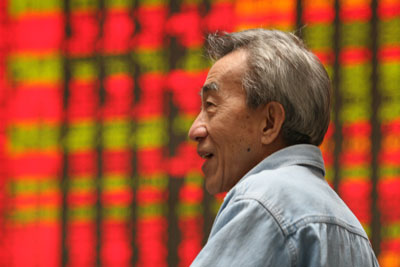Financial shares jack up stock index
By Dong Zhixin (chinadaily.com.cn)Updated: 2007-03-29 15:53
 An investor smiles before an electronic board showing stock information at a securities firm in Xiamen, East China's Fujian Province March 20, 2007. [newsphoto]  |
China's main stock index Thursday rose to record highs for the seventh consecutive session as financial shares soared against the drop of more than eighty percent of shares in the equity market.
The benchmark Shanghai Composite Index closed 0.77 percent up to 3,197.53, extending this year's gains to 19.5 percent.
Nearly all upward strength came from the financial shares which witnessed a full scale increase.
Bank of China surged 6.38 percent to 5.67 yuan while the Industrial and Commercial Bank of China rose 5.47 per cent to 5.59 yuan. Industrial Bank soared by the daily limit of 10 percent before receding to 27.83 yuan, up 7.16 percent from the previous close.
China Life, the country's biggest insurer, went up 1.85 percent to 35.79 yuan while Ping An Insurance gained 1.76 percent to 47.4 yuan.
In contrary to the prosperity of financial shares, most of the shares declined in the Shanghai Stock Exchange, with the losers outnumbered the winners by a ratio of 5 to 1.
Similar to the Shanghai market, the Shenzhen Stock Exchange saw the fall of more than 85 percent of the shares. However, it lacked the financial shares to push up the Shenzhen Composite Index while closed 1.80 percent lower to 820.71.
The Shanghai and Shenzhen 300 index of major companies
also fell. It lost 0.51 percent to 2,783.30.
Strong investment
sentiment in funds
Chinese citizens' investment in funds has jumped to a record high, according to a survey by the
central bank released Wednesday.
Funds account for 16.7 percent, unprecedented high, of Chinese residents' holdings of financial assets in the first quarter of the year, up from 10 percent in the previous quarter, the result of the survey showed.
Deposit remained to be the major financial assets, but its proportion has dropped to an all-time low of 59.4 percent. The decrease was attributed to low interest rate and magnet effect of the stock market.
Some 58.4 percent of the polled citizens believed that the interest rate is low, an increase of 3.2 percent from the previous quarter. The country's benchmark one-year deposit rate stands at 2.79 percent after a 0.27 percentage point rise two weeks ago.
But the real interest rate is actually negative, given the accelerating inflation and interest tax. Consumer Price Index, a key indicator of inflation, surged 2.7 percent in February. Chinese residents' interest income is subject to a 20 percent tax.
A bullish stock market also contributed to the reduction in the proportion of deposits. The benchmark Shanghai Composite Index has grown nearly 20 percent after rallying 130 percent last year.
The share of stocks in the residents' financial assets holdings rose two percent, said the result of the survey posted on the central bank's website, without giving a specific percentage of the stocks in the holdings.
Meanwhile, 30.3 percent of the surveyed residents thought the purchase of stocks or funds are worthwhile under the current interest rate and commodities price level, an increase of 11.7 percent from the previous quarter.
The number of funds in the country has topped 300 by the end of 2006, with a market value of nearly 1 trillion yuan, official statistics showed.
Last year witnessed the awesome addition of 7.8 million funds investors. Before that, China has only 6.5 million funds investors after more than seven years of development.
In 2006, equity funds made up nearly 50 percent of the funds market, replacing balanced funds as the mainstream product, earlier reports said.
|
||
|
||
|
|

